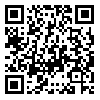Volume 7, Issue 2 (3-2014)
2014, 7(2): 13-22 |
Back to browse issues page
Download citation:
BibTeX | RIS | EndNote | Medlars | ProCite | Reference Manager | RefWorks
Send citation to:



BibTeX | RIS | EndNote | Medlars | ProCite | Reference Manager | RefWorks
Send citation to:
Mirzaie K, Abdollahi M H, Shahgholian M. The Relationship between Metacognitive Beliefs, Social Anxiety and Shyness: The Role of Emotion Regulation Strategies. Research in psychological health 2014; 7 (2) :13-22
URL: http://rph.khu.ac.ir/article-1-1695-en.html
URL: http://rph.khu.ac.ir/article-1-1695-en.html
1- , shahgholian@yahoo.com
Abstract: (15771 Views)
This study aimed at investigating the relationship between metacognitive beliefs, social anxiety and shyness considering the mediating role of emotion regulation. 700 high school students completed the Stanford Shyness and Social Anxiety questionnaires. According to the extreme scores in the scales, 110 subjects were selected as shy individuals and 46 subjects were selected as individuals with the social anxiety disorder. To distinguish the shy people with/without symptoms of social anxiety, the SPIN were performed on shy sample again and based on the extreme scores, there were 45 subjects with social anxiety symptoms and 60 subjects without social anxiety symptoms. 43 subjects in all three groups completed Emotion Regulation and Metacognitive Beliefs questionnaires. The results showed significant relationship between metacognitive beliefs, emotion regulationstrategies and social anxiety and shyness with/without symptoms of social anxiety. There was a significant relationship between metacognitive beliefs and suppression in social anxiety sample and between metacognitive beliefs and cognitive reappraisal in the shy group with symptoms but there was no significant relationship in shy group without symptoms. Regression analysis showed that some components if metacognitive beliefs including negative beliefs and thought control through suppression could predict the social anxiety better and those components of positive belief and cognitive assurance through cognitive reappraisal could predict the shyness with the symptoms of social anxiety. The results showed that the metacognitive beliefs could predict the shyness without the symptoms of anxiety through the mediation of emotion regulation.
Type of Study: Research |
Published: 2014/03/15
Published: 2014/03/15
Send email to the article author
| Rights and permissions | |
 | This work is licensed under a Creative Commons Attribution-NonCommercial 4.0 International License. |





